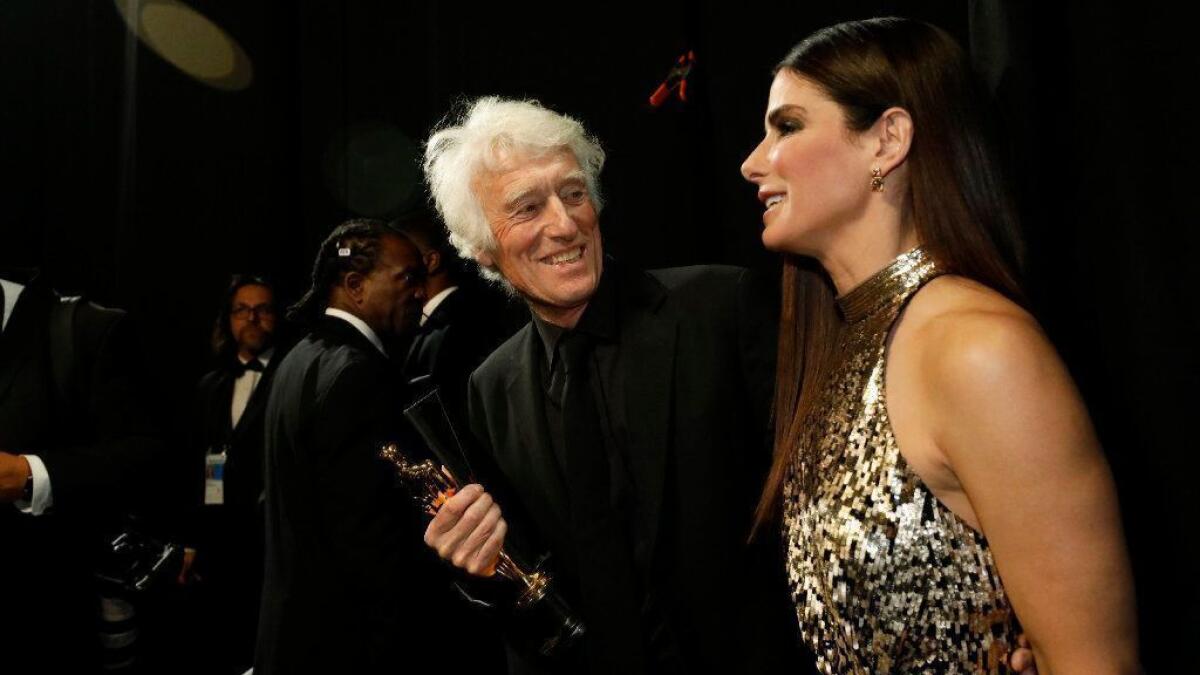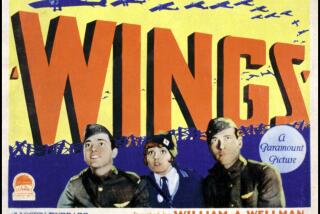Film industry blasts academy decision to omit four categories from the Oscars telecast

It’s one of the oldest clichés in Hollywood: When it comes the Academy Awards, it’s an honor just to be nominated.
Well, it turns out that honor has its limits.
When the motion picture academy announced Monday that it would move four key awards to commercial breaks during this year’s Oscars telecast in an effort to keep the show to a slimmed-down three hours, the blowback from both within the film industry and outside of it was swift and intense.
Facing steadily declining ratings for the Oscars and perennial complaints about the show’s bloated length, the academy’s board of governors voted last August to cut a handful of the 24 award categories out of the live broadcast — a break with tradition that prompted grumbling from some members. But when academy president John Bailey revealed in a letter to members that those categories would include some of filmmaking’s most vital crafts — cinematography, editing and makeup and hairstyling — that grumbling became a roar, with some of the industry’s most prominent voices expressing their deep dismay.
“Without cinematographers and film editors, I would be lost, wandering in the cinema wilderness,” Spike Lee — who is nominated this year for best director for “BlacKkKlansman” alongside the film’s editor, Barry Alexander Brown — wrote in an email to The Times.
“I think it’s outrageous,” said Jim Burke, who served as a producer on the best picture-nominated “Green Book.” “To not publicly recognize editors and cinematographers is a big mistake. I’m in favor of a shorter show but not at the expense of these two vital components to the filmmaking process.”
COMMENTARY: An Oscar is still an Oscar — even if the big moment isn’t televised »
Alfonso Cuarón, whose poetic film “Roma” has earned 10 Oscar nods including best picture, took to Twitter to voice his frustration, as did other Oscar winners including Guillermo del Toro and Russell Crowe.
“In the history of CINEMA, masterpieces have existed without sound, without color, without a story, without actors and without music,” wrote Cuarón, who was nominated both for his direction and cinematography work on “Roma.” “No one single film has ever existed without CINEMAtography and without editing.”
On Tuesday, American Society of Cinematographers president Kees van Oostrum sent a letter to the group’s members — of which Bailey is one — calling the academy’s decision “most unfortunate,” writing, “We cannot quietly condone this decision without protest.”
While most reserved their deepest consternation over the cinematography and editing snubs, “Green Book” director Peter Farrelly threw in support for the hairstyling and makeup nominees as well.
Referring to a notoriously raunchy sight gag in the 1998 Farrelly Brothers comedy “There’s Something About Mary” involving Cameron Diaz’s hair, Farrelly told The Times, “Without hair and makeup, we got no movie. That goes straight to video without that hair.”
The academy’s leadership — which decided which categories to cut in conjunction with governors from the impacted branches — expected some degree of blowback to the announcement, according to a source within the organization. Still, it was surprised by the ferocity of the criticism, chalking it up to a misperception that the selected awards, which also include live-action short, were being jettisoned from the show entirely.
Indeed, in his letter to members, Bailey stressed that the academy was “still honoring the achievements of all 24 awards on the Oscars,” noting that the winners’ speeches would be edited into a later point in the telecast and that the four awards presentations will be live-streamed in their entirety on Oscar.com, a first for the ceremony. According to an academy insider, the awards will be presented in the exact same manner as every other category.
You move the Oscars for the two jobs that are hand-in-hand collaborations with the director but televise the award for animated short. It’s offensive.
— Anonymous film academy member on the decision to not televise certain Oscar categories
Still, for many members, the takeaway was that the academy was throwing some of its most critical crafts under the bus in an ill-conceived gambit to score higher ratings.
“People are enraged,” said one member, who declined to speak on the record due to the sensitivity of the subject. “Editing and cinematography? Seriously? You move the Oscars for the two jobs that are hand-in-hand collaborations with the director but televise the award for animated short. It’s offensive.”
Nevertheless, with the ratings for last year’s telecast hitting an all-time low, many within the academy’s leadership felt that trimming some awards out of the live broadcast, while painful, was long overdue. Speaking to The Times in September, Bailey anticipated that there would be some pushback against the idea but insisted that it had been given careful consideration.
“Nothing is going to be thrown off the show — all 24 awards are going to be done in the show,” Bailey said, predicting at that point that as many as eight awards could be ultimately moved to commercial breaks. “They’ll be slightly edited and given during the course of the show, the way the Tonys do. At board meetings, when we were considering all of these things, we looked at one of these edited versions, and they were great. The walk down the aisle was trimmed a little bit. Cumulatively, it’s going to save some time.”
Bailey declined to comment for this story, as did the show’s producers, Donna Gigliotti and Glenn Weiss.
Notably, Bailey is himself a cinematographer and his wife, Carol Littleton, is an editor, with both sitting on the academy’s board of governors. Some have suggested that the two felt obligated to take the lead in moving their branches’ awards to commercial breaks.
“I heard they wanted to be an example and be selfless,” said one academy member, who declined to comment on the record so as not to offend the group’s leadership. “That’s very noble — and very stupid.”
For the academy, the flap is just the latest in a string of public-relations crises and controversies to plague this year’s show, which saw a planned new award for “best popular film” scrapped and its chosen host, Kevin Hart, pull out amid controversy over a string of past homophobic tweets. For the first time in 30 years, this year’s Oscars will have no formal host, creating a sense among many that Hollywood’s biggest night is rudderless.
Despite the perceived missteps, however, some are sympathetic to the conundrum the academy faces. Producer and former studio executive Bill Mechanic, who previously served on the academy’s board of governors, said the organization finds itself being tugged in opposing directions as it attempts to rein in and reinvigorate the Oscars while also preserving its mission of honoring cinema’s best and brightest.
“People in the academy have different views: Is the Oscars an entertainment show, or is it a show for its membership?” said Mechanic, who produced the Oscars telecast with Adam Shankman in 2010. “If it’s an entertainment show — which I think it has to be — then, you have to figure out how it plays as entertainment. There’s no way not to cut... The first Oscar telecasts had a third fewer awards and a two-hour time limit. At some point, more and more awards and a four-hour show just does not work for an audience.”
Indeed, ABC, which airs the Oscars, made it clear from the outset that it wanted to limit this year’s telecast to three hours, even as it left it up to the academy to figure out exactly how it would get there.
“The academy promised ABC last year, after a very lengthy telecast … to keep the show to three hours,” ABC Entertainment President Karey Burke said during her Television Critics Association press conference last week. “So the producers, I think, wisely decided to not have a host and to go back to having the presenters and the movies be the stars, and that will be the best way that we kind of keep the show at a brisk three hours.”
People watch three hours of ‘The Bachelor.’ They will certainly watch four of the Oscars. Just tell people it is a binge.
— Judd Apatow
Some, however, would rather let the Oscars run long than see some nominees get slighted.
“I understand the demands of time, but I think people would rather have a great show than a rushed show with less awards and less entertainment,” said producer and director Judd Apatow. “I think they should just do a great four-hour show. People watch three hours of ‘The Bachelor.’ They will certainly watch four of the Oscars. Just tell people it is a binge.”
Despite the firestorm, academy insiders say that, with less than two weeks to go before the show, the group is unlikely to reverse its decision. The board of governors has already stated that, in future shows, four to six other categories will be selected on a rotating basis to be presented during commercial breaks. The four awards omitted from this year’s live broadcast will be guaranteed on-air slots in 2020.
“I’m an academy member, and we knew this was coming. Not a surprise for us. I go to the meetings. This is an experiment. It’s not written in stone,” says Sue Cabral-Ebert, a former president of the makeup artists and hairstylists guild. “Some people think the awards aren’t going to be given at all. They are. Take a deep breath. We’re still going to have our time. You’re just not going to see us come up the aisle.”
The fact is, for all the displeasure being voiced across the industry over the academy’s break with decades of tradition, it’s likely that many, if not all, of those who end up with a gold statuette on Oscar night will take the victory any way they can get it.
Asked if he would be upset to see his longtime editor accept an Oscar during a commercial break, Lee wrote, “I’d take that in a NY millisecond. He would too. Fo’sho.”
Times staff writer Stephen Battaglio contributed to this report.
More to Read
Only good movies
Get the Indie Focus newsletter, Mark Olsen's weekly guide to the world of cinema.
You may occasionally receive promotional content from the Los Angeles Times.







